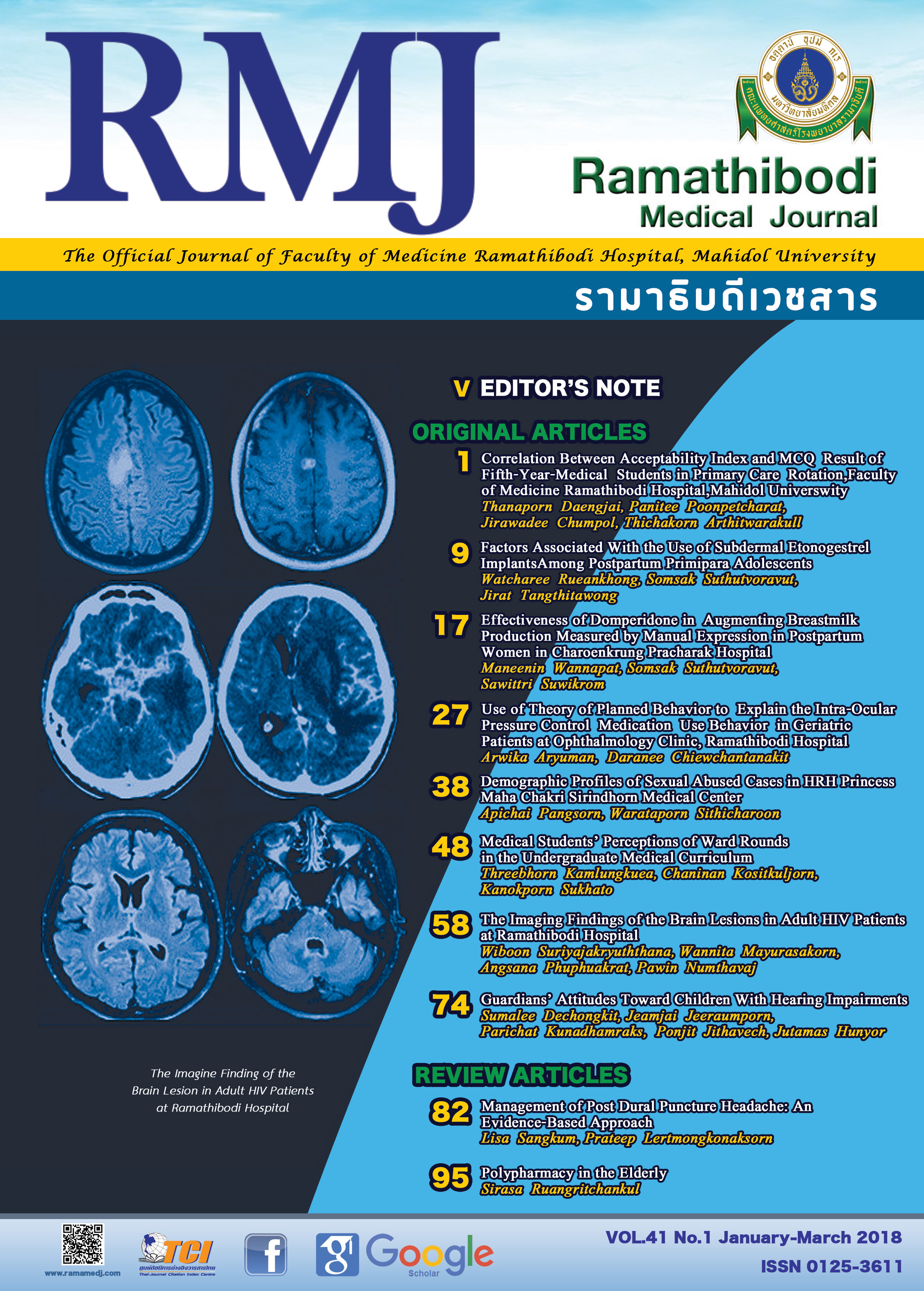Guardians’ Attitudes Toward Children With Hearing Impairments
DOI:
https://doi.org/10.14456/rmj.2018.10Keywords:
Attitude, Hearing impairments, Guardian, เจตคติ, ความบกพร่องทางการได้ยิน, ผู้ปกครองAbstract
Background: The attitudes of guardians have a significant impact on the social, emotional, and psychological development of children with disabilities. Guardians’ negative attitudes toward children with hearing impairments may affect the ways of nurturing their children.
Objective: To determine the attitudes of guardians toward their children with hearing impairments. The guardians’ attitudes were determined by using a Thai language questionnaire regarding their attitudes towards people with disabilities, which was composed of 30 items with a total score of 180. Higher scores reflected more positive attitudes.
Methods: The questionnaires were distributed to 47 guardians. Forty-two questionnaires were completed for analysis.
Results: The attitude scores ranged from 54 to 118 with a mean of 89.38 and a standard deviation of 16.46. There was a relationship between their attitudes and a set of 5 characteristics of guardians which were age, educational level, income, degree of contact, and knowledge about hearing loss by using multiple regressions. Thirty-five percent of the variance of guardian attitudes was accounted for by a linear combination of the five guardian characteristic variables. The educational level of guardians was found to have a positive relationship with attitudes of guardians.
Conclusions: The mean score of guardian attitudes was 89.38. Among the 5 guardian characteristic variables, the education level was positively correlated to guardian attitudes.
References
Horne MD. Attitudes toward handicapped students: Professional, peer, and parent reactions. Hillsdale, NJ: Lawrence Erlbaum Associates; 1985.
Kumar S, Rao G. Parental attitudes towards children with hearing impairment. APDRJ. 2008;19(2):111-117.
Adox S. Grandparenting special needs children: Coping with challenges is a family affair. The Spruce website. https://www.thespruce.com/grandparenting-special-needs-children-1695846. Updated January 16, 2017. Accessed February 13, 2018.
Dharitri R, Murthy VN. Hearing impaired children: their behavior problem and parental attitudes. J Clin Psychol. 1990;17(1):12-16.
Kemp LCD. Environmental and other characteristics determining attainment in primary schools. Br J Educ Psychol. 1955;25(2):67-77. doi:10.1111/j.2044-8279.1955.tb01339.x.
Taylor E, Chadwick O, Heptinstall E, Danckaerts M. Hyperactivity and conduct problems at risk factors for adolescent development. J Am Acad Child Adolesc Psychiatry. 1996;35(9):1213-1226.
Fox NA, Kimmerly NL, Schafer WD. Attachment to mother/attachment to father: a meta-analysis. Child Dev. 1991;62(1):210-225.
Kurian T. A Survey of parental attitudes towards their hard of hearing children. JAIISH. 1978;1:1-9.
Wanjiru TN. Parental attitudes towards children with hearing impairment and academic performance: a case of Kambui School for the deaf. [master’s thesis]. Githunguri District, Kiambu: Kenya, Kenyatta University; 2014.
Dechongkit S. Selected relationships and descriptions concerning attitude toward and knowledge about people with disabilities among university faculty members in Thailand. [dissertation]. Illinois, USA: Illinois State University; 1999.
Suksabai W, Dechongkit S. Attitudes of nurse teaching associates toward people with disabilities. Rama Med J. 2004;24:1-6.
Yuker H, Block J, Younng J. The measurement of attitudes toward disabled persons. Albertson, NY: Human Resources Center; 1966.
Zernitsky-Shurka E. The impact of cultural: ethnic, religious, and national variables persons with disabilities. In: Yuker HE, ed. Attitudes toward persons with disabilities. New York, NY: Springer; 1988:154-163.
Cuskelly M, Gilmore L. The home and family environment and its impact on school achievement. SAJE. 2007;8:287-297.
Staniland L. Public perceptions of disabled people: Evidence from the British social attitudes survey 2009. London: The Office for Disability Issues; 2011. https://www.gov.uk/government/uploads/system/uploads/attachment_data/file/325989. Accessed February 13, 2018.
Dunst CJ, Trivette CM. Assessment of social support in early interventions programs. In: Meisels SJ, Shonkoff JP, eds. Handbook of Early Childhood Intervention. New York: Cambridge University Press; 1990:326-349.
Bell HM. Manual for the Adjustment Inventory (student form) Standard. California: Stanford University Press; 2004.
Forer LK. Birth Order and Life Roles. Springfield, IL: Illinois Press; 1999.
Yazbeck R, Parmenter U. Parent-child relationship and ADHD symptoms: a longitudinal analysis. J Abnorm Child Psychol. 2004;36(2):285-296.
McLoyd VC. The impact of economic hardship on black families and children: Psychological distress, parenting and social emotional development. Child Dev. 1990;61(2):311-346.
Rank NR. Socialization status. In: Nichols WC, Pace-Nichol MA, Becvar DS, Napler AY, eds. Handbook of development and intervention. New York, NY: Wiley; 2000.
Sylvia M. Attitudes of Pre-school Teachers Towards inclusive education for children with hearing impairments. [master’s thesis]. Kenya: Kenyatta University; 2002.
Yuker H. Variables that influence attitudes toward people with disabilities: conclusions from the data. J Soc Behav Personal. 1994;9:3-22.
Hung HL, Paul PV. Inclusion of students who are deaf or hard of hearing: secondary school hearing students’ perspectives. Deafness Educ Int. 2006;8(2):62-74.

















